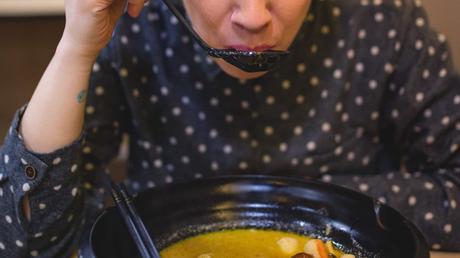You go to your favorite noodle restaurant and you order the ramen. But as the food arrives you can immediately tell that something is wrong.
Your big bowl of ramen smells very distinctly like ammonia, which is certainly not something you want your food to smell like.
This is rare, but if this happens to you you will likely want to know what happened and why.

Why does my ramen smell like ammonia?
The reason for this smell is due to the fact that certain types of ramen noodles, specifically the ones used by Chinese noodle restaurants, have alkali water in them as an ingredient. Alkali water helps with the texture of the noodles, but there is one main issue with this type of noodle. If the water used to boil and cook the noodles isn’t changed regularly it concentrates the alkali. This is where the ammonia smell comes from.
Also read: can you make instant ramen noodles with cold water?
That sounds disgusting! Is this a bad thing?
Well, that depends on your definition of bad. Likely, the ramen is still safe to eat if that is what you are concerned about at the time. However, it is bad for the dish. After all, who wants to eat something that smells awful? If you are going to go and spend money to eat somewhere, you are going to want the food to be a pleasant experience.
Not to mention it is also bad for a restaurant’s reputation to have ramen that smells like ammonia.
Are there any noodles I can ask for to avoid this?
Not really. Since the reason for ramen smelling like ammonia is because of the boiling water being mishandled in the kitchen, there isn’t much you can do about this as a customer. Only restaurants that use certain kinds of Chinese noodles will have this potential issue. If the ramen that you eat uses Japanese noodles, then ramen with an ammonia odor is not something you are likely to experience.
If you still want your ramen to use Chinese noodles, there is another option to avoid having a meal that reaks of ammonia. Since it is unlikely that you are cooking a large amount of ramen around the clock at your house, you can just make your ramen at home. Unless you are cooking for dozens of people, it is very unlikely you will end up in a situation where you aren’t changing the water frequently enough.
